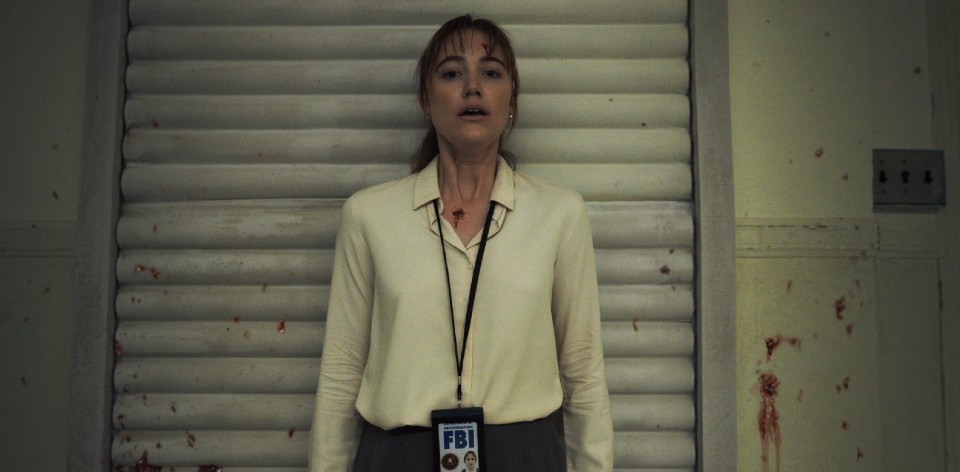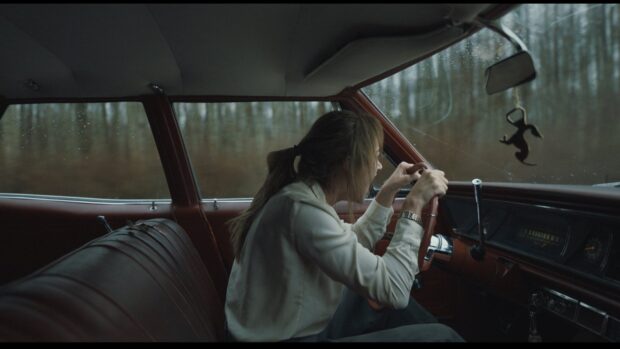Supported by a viral marketing campaign reminiscent of The Blair Witch Project buzz, LONGLEGS knows its horror history. In fact, writer/director Osgood Perkins has been steeped in it for four decades, after making his screen debut as a young version of his father’s Norman Bates character in Psycho II (1983). So, it’s no surprise that this film nods to some icons while being quite unnerving in the process.
Perkins starts the process of keeping the audience off kilter from the opening scenes, in which a little girl about to have a birthday party is approached by a white-faced man (Nicolas Cage). Set in the 1970s, complete with a 4:3 aspect ratio and rounded corners, Greg Ng and Graham Fortin’s phenomenal editing cuts him off mid-sentence for a terrifying title drop, a motif that the film continues to use as a way of slapping us out of complacency.
As the narrative shifts gears to the 1990s, introducing us to green and seemingly mildly psychic FBI agent Lee Harker (Maika Monroe), the screen widens like eyes in terror. Following a brutal incident in the field, Harker’s superior Agent Carter (Blair Underwood) puts her on the trail of the Longlegs killer. Against probability, his cold trail grows warm under her watch – with revelations that sit a little too close for comfort.
Perkins’ film occupies a space between the Satanic panic films of the 1970s and the 90s serial killer films like Se7en and The Silence of the Lambs. The director has referred to the latter as a “shorthand for the audience to feel engaged.” In this territory, LONGLEGS is a wholly disquieting investigative piece that dwells in the realms of shadow and light. While Perkins also cites John Cassavetes, Gus Van Sant, and Bob Dylan as influences, it’s the aesthetics of Jonathan Demme and David Fincher that he wears on his sleeve. (Hell, even the end-credits run backwards).
Of course, if that was the totality of Perkins’ picture, we probably wouldn’t still be talking about it. With a discordant and often brain-scouring score by Zilgi (aka Elvis Perkins), coupled with the crispness of Pat Scola’s controlled photography, the opening act of this picture cuts into our psyches with scalpel-like precision.
Yet Perkins is also tied to certain things that he has trouble shaking in the back half. Nicolas Cage certainly disappears physically and audibly into the role. Still, at this point in his career there are certain ‘Cageisms’ (let’s call them) that break the fragile reality of the story. Cage screaming ‘Mommy’ in a car, not to mention the ‘shock value’ of his interrogatory denouement, elicited more than a few laughs from this viewer. By contrast, Alicia Witt (as Harker’s mother) has a restrained grace and control to her performance that is even more chilling than the primary villain.
Which ultimately brings us to the final part of the film, labelled ‘Birthday Girls’ on screen. Without revealing any spoilers, certain information comes to light that will either bring all the threads together or just leave you frustratingly cold. For me, it was a bit like another film influence entirely tacked onto the end of one that had already established a particular flavour.
The film works best as an investigative psychological horror, blending modern sensibilities with a throwback aesthetic. It’s a terrific showcase for the standout performances of Monroe and Witt, and the kind of movie that is made for horror fan cults. One just hopes it remains a self-contained story that acknowledges the power of brevity.
2024 | USA | DIRECTOR: Osgood Perkins | WRITERS: Osgood Perkins | CAST: Maika Monroe, Nicolas Cage, Blair Underwood, Alicia Witt, Michelle Choi-Lee, Dakota Daulby | DISTRIBUTOR: Neon (USA), Rialto Distribution (Australia) | RUNNING TIME: 101 minutes | RELEASE DATE: 12 July 2024 (USA), 18 July 2024 (Australia)






